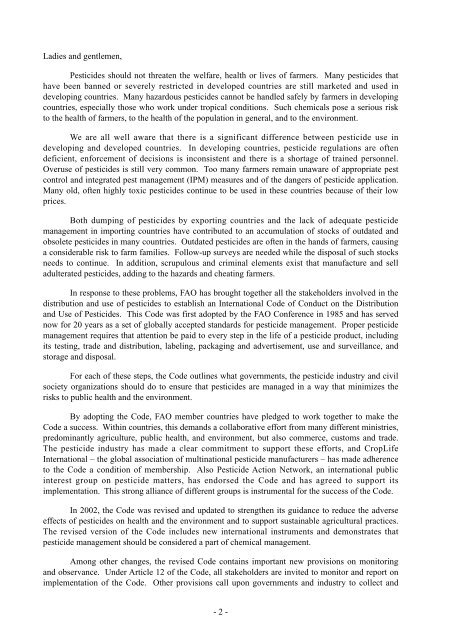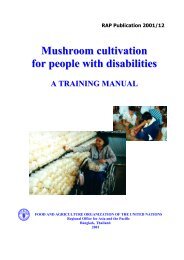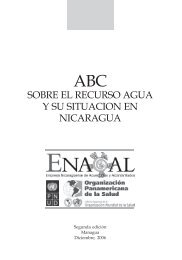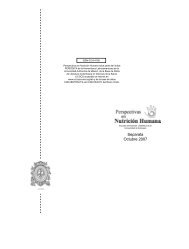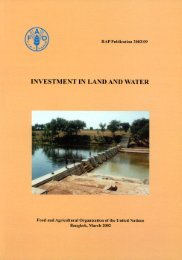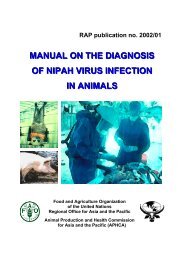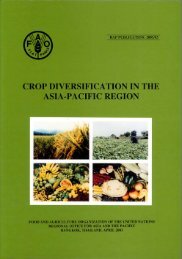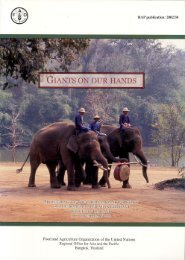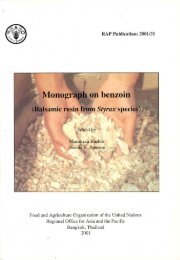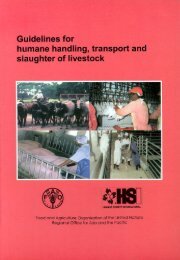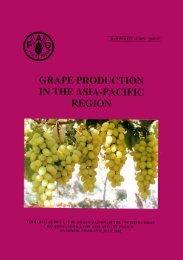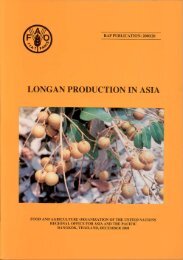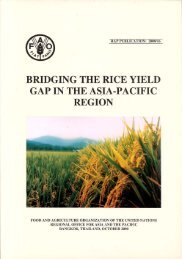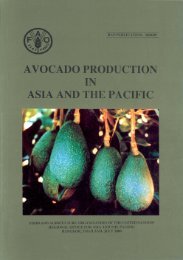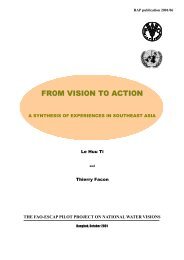Proceedings of the Asia regional workshop on the
Proceedings of the Asia regional workshop on the
Proceedings of the Asia regional workshop on the
You also want an ePaper? Increase the reach of your titles
YUMPU automatically turns print PDFs into web optimized ePapers that Google loves.
Ladies and gentlemen,<br />
Pesticides should not threaten <str<strong>on</strong>g>the</str<strong>on</strong>g> welfare, health or lives <str<strong>on</strong>g>of</str<strong>on</strong>g> farmers. Many pesticides that<br />
have been banned or severely restricted in developed countries are still marketed and used in<br />
developing countries. Many hazardous pesticides cannot be handled safely by farmers in developing<br />
countries, especially those who work under tropical c<strong>on</strong>diti<strong>on</strong>s. Such chemicals pose a serious risk<br />
to <str<strong>on</strong>g>the</str<strong>on</strong>g> health <str<strong>on</strong>g>of</str<strong>on</strong>g> farmers, to <str<strong>on</strong>g>the</str<strong>on</strong>g> health <str<strong>on</strong>g>of</str<strong>on</strong>g> <str<strong>on</strong>g>the</str<strong>on</strong>g> populati<strong>on</strong> in general, and to <str<strong>on</strong>g>the</str<strong>on</strong>g> envir<strong>on</strong>ment.<br />
We are all well aware that <str<strong>on</strong>g>the</str<strong>on</strong>g>re is a significant difference between pesticide use in<br />
developing and developed countries. In developing countries, pesticide regulati<strong>on</strong>s are <str<strong>on</strong>g>of</str<strong>on</strong>g>ten<br />
deficient, enforcement <str<strong>on</strong>g>of</str<strong>on</strong>g> decisi<strong>on</strong>s is inc<strong>on</strong>sistent and <str<strong>on</strong>g>the</str<strong>on</strong>g>re is a shortage <str<strong>on</strong>g>of</str<strong>on</strong>g> trained pers<strong>on</strong>nel.<br />
Overuse <str<strong>on</strong>g>of</str<strong>on</strong>g> pesticides is still very comm<strong>on</strong>. Too many farmers remain unaware <str<strong>on</strong>g>of</str<strong>on</strong>g> appropriate pest<br />
c<strong>on</strong>trol and integrated pest management (IPM) measures and <str<strong>on</strong>g>of</str<strong>on</strong>g> <str<strong>on</strong>g>the</str<strong>on</strong>g> dangers <str<strong>on</strong>g>of</str<strong>on</strong>g> pesticide applicati<strong>on</strong>.<br />
Many old, <str<strong>on</strong>g>of</str<strong>on</strong>g>ten highly toxic pesticides c<strong>on</strong>tinue to be used in <str<strong>on</strong>g>the</str<strong>on</strong>g>se countries because <str<strong>on</strong>g>of</str<strong>on</strong>g> <str<strong>on</strong>g>the</str<strong>on</strong>g>ir low<br />
prices.<br />
Both dumping <str<strong>on</strong>g>of</str<strong>on</strong>g> pesticides by exporting countries and <str<strong>on</strong>g>the</str<strong>on</strong>g> lack <str<strong>on</strong>g>of</str<strong>on</strong>g> adequate pesticide<br />
management in importing countries have c<strong>on</strong>tributed to an accumulati<strong>on</strong> <str<strong>on</strong>g>of</str<strong>on</strong>g> stocks <str<strong>on</strong>g>of</str<strong>on</strong>g> outdated and<br />
obsolete pesticides in many countries. Outdated pesticides are <str<strong>on</strong>g>of</str<strong>on</strong>g>ten in <str<strong>on</strong>g>the</str<strong>on</strong>g> hands <str<strong>on</strong>g>of</str<strong>on</strong>g> farmers, causing<br />
a c<strong>on</strong>siderable risk to farm families. Follow-up surveys are needed while <str<strong>on</strong>g>the</str<strong>on</strong>g> disposal <str<strong>on</strong>g>of</str<strong>on</strong>g> such stocks<br />
needs to c<strong>on</strong>tinue. In additi<strong>on</strong>, scrupulous and criminal elements exist that manufacture and sell<br />
adulterated pesticides, adding to <str<strong>on</strong>g>the</str<strong>on</strong>g> hazards and cheating farmers.<br />
In resp<strong>on</strong>se to <str<strong>on</strong>g>the</str<strong>on</strong>g>se problems, FAO has brought toge<str<strong>on</strong>g>the</str<strong>on</strong>g>r all <str<strong>on</strong>g>the</str<strong>on</strong>g> stakeholders involved in <str<strong>on</strong>g>the</str<strong>on</strong>g><br />
distributi<strong>on</strong> and use <str<strong>on</strong>g>of</str<strong>on</strong>g> pesticides to establish an Internati<strong>on</strong>al Code <str<strong>on</strong>g>of</str<strong>on</strong>g> C<strong>on</strong>duct <strong>on</strong> <str<strong>on</strong>g>the</str<strong>on</strong>g> Distributi<strong>on</strong><br />
and Use <str<strong>on</strong>g>of</str<strong>on</strong>g> Pesticides. This Code was first adopted by <str<strong>on</strong>g>the</str<strong>on</strong>g> FAO C<strong>on</strong>ference in 1985 and has served<br />
now for 20 years as a set <str<strong>on</strong>g>of</str<strong>on</strong>g> globally accepted standards for pesticide management. Proper pesticide<br />
management requires that attenti<strong>on</strong> be paid to every step in <str<strong>on</strong>g>the</str<strong>on</strong>g> life <str<strong>on</strong>g>of</str<strong>on</strong>g> a pesticide product, including<br />
its testing, trade and distributi<strong>on</strong>, labeling, packaging and advertisement, use and surveillance, and<br />
storage and disposal.<br />
For each <str<strong>on</strong>g>of</str<strong>on</strong>g> <str<strong>on</strong>g>the</str<strong>on</strong>g>se steps, <str<strong>on</strong>g>the</str<strong>on</strong>g> Code outlines what governments, <str<strong>on</strong>g>the</str<strong>on</strong>g> pesticide industry and civil<br />
society organizati<strong>on</strong>s should do to ensure that pesticides are managed in a way that minimizes <str<strong>on</strong>g>the</str<strong>on</strong>g><br />
risks to public health and <str<strong>on</strong>g>the</str<strong>on</strong>g> envir<strong>on</strong>ment.<br />
By adopting <str<strong>on</strong>g>the</str<strong>on</strong>g> Code, FAO member countries have pledged to work toge<str<strong>on</strong>g>the</str<strong>on</strong>g>r to make <str<strong>on</strong>g>the</str<strong>on</strong>g><br />
Code a success. Within countries, this demands a collaborative effort from many different ministries,<br />
predominantly agriculture, public health, and envir<strong>on</strong>ment, but also commerce, customs and trade.<br />
The pesticide industry has made a clear commitment to support <str<strong>on</strong>g>the</str<strong>on</strong>g>se efforts, and CropLife<br />
Internati<strong>on</strong>al – <str<strong>on</strong>g>the</str<strong>on</strong>g> global associati<strong>on</strong> <str<strong>on</strong>g>of</str<strong>on</strong>g> multinati<strong>on</strong>al pesticide manufacturers – has made adherence<br />
to <str<strong>on</strong>g>the</str<strong>on</strong>g> Code a c<strong>on</strong>diti<strong>on</strong> <str<strong>on</strong>g>of</str<strong>on</strong>g> membership. Also Pesticide Acti<strong>on</strong> Network, an internati<strong>on</strong>al public<br />
interest group <strong>on</strong> pesticide matters, has endorsed <str<strong>on</strong>g>the</str<strong>on</strong>g> Code and has agreed to support its<br />
implementati<strong>on</strong>. This str<strong>on</strong>g alliance <str<strong>on</strong>g>of</str<strong>on</strong>g> different groups is instrumental for <str<strong>on</strong>g>the</str<strong>on</strong>g> success <str<strong>on</strong>g>of</str<strong>on</strong>g> <str<strong>on</strong>g>the</str<strong>on</strong>g> Code.<br />
In 2002, <str<strong>on</strong>g>the</str<strong>on</strong>g> Code was revised and updated to streng<str<strong>on</strong>g>the</str<strong>on</strong>g>n its guidance to reduce <str<strong>on</strong>g>the</str<strong>on</strong>g> adverse<br />
effects <str<strong>on</strong>g>of</str<strong>on</strong>g> pesticides <strong>on</strong> health and <str<strong>on</strong>g>the</str<strong>on</strong>g> envir<strong>on</strong>ment and to support sustainable agricultural practices.<br />
The revised versi<strong>on</strong> <str<strong>on</strong>g>of</str<strong>on</strong>g> <str<strong>on</strong>g>the</str<strong>on</strong>g> Code includes new internati<strong>on</strong>al instruments and dem<strong>on</strong>strates that<br />
pesticide management should be c<strong>on</strong>sidered a part <str<strong>on</strong>g>of</str<strong>on</strong>g> chemical management.<br />
Am<strong>on</strong>g o<str<strong>on</strong>g>the</str<strong>on</strong>g>r changes, <str<strong>on</strong>g>the</str<strong>on</strong>g> revised Code c<strong>on</strong>tains important new provisi<strong>on</strong>s <strong>on</strong> m<strong>on</strong>itoring<br />
and observance. Under Article 12 <str<strong>on</strong>g>of</str<strong>on</strong>g> <str<strong>on</strong>g>the</str<strong>on</strong>g> Code, all stakeholders are invited to m<strong>on</strong>itor and report <strong>on</strong><br />
implementati<strong>on</strong> <str<strong>on</strong>g>of</str<strong>on</strong>g> <str<strong>on</strong>g>the</str<strong>on</strong>g> Code. O<str<strong>on</strong>g>the</str<strong>on</strong>g>r provisi<strong>on</strong>s call up<strong>on</strong> governments and industry to collect and<br />
- 2 -


